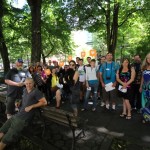Ben Stocking: A Journalist in Vietnam by Bridgette
B: Ben, tell us a little bit about yourself. How long have you been a journalist and what are you doing now?
Ben: I spent 30 years in journalism, working as a reporter and editor at various newspapers around the country. I wrote about race relations, immigration, poverty, and politics, including a couple of presidential elections. Eventually I became a foreign correspondent in Vietnam, first for the San Jose Mercury News, then for the Associated Press.
My family and I moved to Seattle two years ago, when my wife took a job in the global health division of the Gates Foundation. We’ve been here two years now. I’ve been doing various freelance writing assignments and working on a novel set in Vietnam.

B: What prompted you to move to Vietnam? How long were you there and where about did you live?
Ben: I never intended to move to Vietnam or to become a foreign correspondent. When the Mercury News asked me to take the Vietnam assignment, it came as a complete surprise. From the minute my wife and I set foot in Hanoi, though, we loved the place. We arrived in 2002, when our children were 2 and 5 years old, and didn’t return until eight years later. We lived on the outskirts of Hanoi in a gorgeous villa near a lake. Our kids attended a wonderful international school. We were very spoiled and very lucky.
B: Tell us about the work you did whilst there. What type of assignments did you have and what were you documenting?
Ben: During the first three years, I served as Southeast Asia Bureau Chief for the Mercury News, which serves a large population of Vietnamese refugees who came to the U.S. after the war. After that, I served as Vietnam bureau chief for the Associated Press. In both jobs, I wrote about the rapid social and economic change that has been transforming the country, which, like its communist neighbor China, has a single-party political system but has been gradually implementing free-market economic reforms.
For two decades after the war, Vietnam was cut off from the West by an economic embargo. The communist government implemented a classic centrally planned economy — with catastrophic results. In recent years, as the government encouraged the establishment of private enterprise, the economy has boomed. The pace of development accelerated after the U.S. and Vietnam restored economic ties in 1994 and again after 2006, when Vietnam was admitted into World Trade Organization.
My work in Vietnam focused on everything from economics to fashion to art to television — I covered anything that conveyed a sense of how quickly and dramatically the country was changing.
I also wrote about more delicate subjects, such as religious and political freedom. Although it has loosened its grip on the economy, Vietnam’s communist government does not tolerate dissent and routinely jails those who speak out.
When major news broke out around the region, I traveled to other countries to cover stories, such as the Asian tsunami in Indonesia and a political coup in Thailand.
B: How was family life in Vietnam? Are there any traditions that you have kept?
Ben: Our life in Vietnam was wonderful. The Vietnamese are extremely generous, and extremely forgiving. At first, we worried that people would not be welcoming to Americans, especially in Hanoi, where people still remember B-52s dropping bombs on them. But anti-Americanism is extremely rare in Vietnam. People were incredibly warm and welcoming, especially if you took the time to learn some Vietnamese.
In every Vietnamese home you will find a family altar, where people burn incense and leave fruit and other offerings to their ancestors. Here in Seattle, we maintain a small altar in memory of my father, who died during my last year in Vietnam.

B: What camera were you shooting with at the time and at which point did the iPhone come into play?
Ben: The Mercury-News sent me off to Vietnam with a Canon 10-D as well as a 200 mm lens and a 15-36mm zoom, both very nice prime lenses. A couple of times a year, they’d send a staff photographer over to load up on features and shoot pictures to accompany my stories. The rest of the time, I was on my own. I basically shot pictures when I needed to illustrate a story or wanted to document a family trip. In 2008, our last year in Hanoi, I purchased an iPhone and started taking pictures with it, mostly while riding around the streets of Hanoi on my motorbike. This was quite foolhardy — the Hanoi traffic is insane, and the risks of an accident are high even if you are driving with two hands and focusing on the road. But there were so many interesting things to photograph on the streets, I couldn’t resist. I’d steer with one and and shoot iPhone pictures with the other. Miraculously, I’m one of the few people I know who lived in Hanoi but never had a fender-bender.
B: What is your fondest memory? Is there a story you’d like to share with us?
Ben: Well, this isn’t a fond memory, but it’s vivid, and it has to do with photography. Once towards the end of my stay in Vietnam, I was arrested for taking photographs of a news event without permission. A group of Catholics — mostly priests and nuns — were holding a candlelight vigil near St. Joseph’s Cathedral, the biggest church in Hanoi. They wanted the communist authorities to return some land they had seized from the church not long after they came to power in 1945. The state controls religion in Vietnam, and protests are generally forbidden. As soon as I started shooting pictures, an undercover cop arrested me and took me to the Security Ministry headquarters, where I was beaten. The cop actually hit me on my head with the 10-D and broke the lens. The entire episode became a minor international incident. One of the protesters videotaped my arrest and posted it on YouTube. It’s still there, and it’s one of the first things that comes up if you Google me. I would have been deported if the American ambassador hadn’t intervened on my behalf. In the end, I got a brand new Canon 5D Mark II out of the deal, courtesy of the Associated Press.
B: What do you miss the most?
Ben: The food, life street life, and the people. Especially the people. They are funny, wise, kind and resourceful. I miss them every day.
Ben: My former AP colleague David Guttenfelder is a brilliant photographer. He’s shot photographs of every international conflict in the last 20 years, including some amazing images from Afghanistan, where he spent a lot of time embedded with U.S. troops. He began posting iPhone pics on his Facebook page long before Instagram turned up, and has recently become an avid Instagramer (dguttenfelder).
Another excellent photojournalist active on Instagram is Tomas van Houtryve (tomasvh). Penny de los Santos (pennydelossantos), a former colleague at the Mercury News, can be found on IG as well.
Other IG favorites: je_k, stickiyinhanoi, ipangwahid, josebandeira, zuoc123, iphonefarmer, and eros_sana.
B: And finally, if you were to travel to any place in the world where would you go and why?
Ben: There are many places I would love to go. I’d be happy to live in Vietnam again, if I ever got the chance, or virtually anywhere in Southeast Asia. Myanmar, which is just opening up after years of totalitarian rule, would be very interesting. I lived in Spain for 2.5 years and speak fluent Spanish, but I’ve never been to Latin America. I’d love to go there. And then there’s Rwanda. My wife recently went there on a work trip and loved it.
I plan to return to Vietnam in the spring with my new iPhone, which is vastly superior to the first-generation phone I used to take these iPhone shots.
—————————
Ben Stocking is a Seattle writer/editor who spent 30 years working in daily journalism, including eight years in Hanoi, where he served as the Vietnam bureau chief for the Associated Press. He is currently working on a novel set in Hanoi.
Email / Twitter / Tumblr (Political blog.) / Kik: benstocking
About Author
Latest stories
 1000 WordsOctober 6, 20141,000 Words: Emotions
1000 WordsOctober 6, 20141,000 Words: Emotions Bridgette ShimaSeptember 29, 2014The Reinvention of Chloe: Chapter 12
Bridgette ShimaSeptember 29, 2014The Reinvention of Chloe: Chapter 12 Bridgette ShimaSeptember 26, 2014Beep Ahhh Fresh Crew
Bridgette ShimaSeptember 26, 2014Beep Ahhh Fresh Crew StoriesSeptember 18, 2014What do you LOVE about #SocialPhotography?
StoriesSeptember 18, 2014What do you LOVE about #SocialPhotography?

I really enjoyed the interview and learning more about this beautiful country. What an experience!
Thank you for sharing, Ben. And thank you, B! I love the inclusion of video to enhance the story.
– r
Thanks, Rachel Marie. Where can I find some of your photos?
Ben, she’s @iwife on IG.
Rachel – glad you liked this piece.
What a fascinating life and such an insight into Vietnam. Loved reading the article. I’m going to show the video to my students. Great work – loved the bicycle series
Would love to know what your students think of the video. Glad you enjoyed this, G.
Great piece, good shots and great memories.
Hey, Martin, fancy meeting you here.
What a fantastic interview b! I enjoyed the video and the wonderful photographs. Wonderful job on capturing the every day lives Ben.
That khong the tin noi doc duoc bai phong van nay. Khi gap anh o Duxton, ba cua Anh van khoe, khong ngo da mat 2 nam sau do. Thanh that chia buon Ben. Ly